模块1 Unit 1 Friendship(浙江省温州市瑞安市)
文档属性
| 名称 | 模块1 Unit 1 Friendship(浙江省温州市瑞安市) | 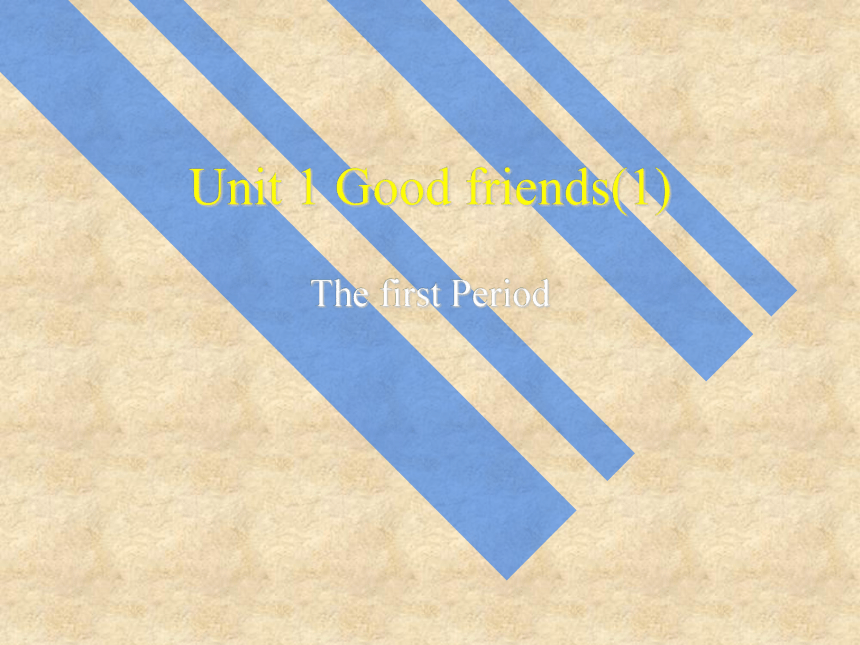 | |
| 格式 | rar | ||
| 文件大小 | 215.1KB | ||
| 资源类型 | 教案 | ||
| 版本资源 | 人教版(新课程标准) | ||
| 科目 | 英语 | ||
| 更新时间 | 2007-09-10 16:44:00 | ||
图片预览

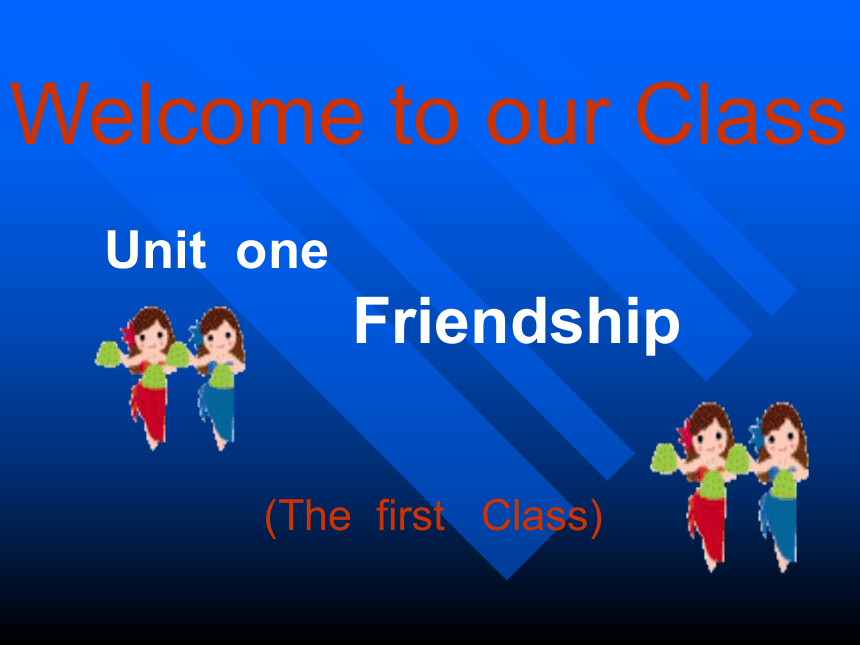

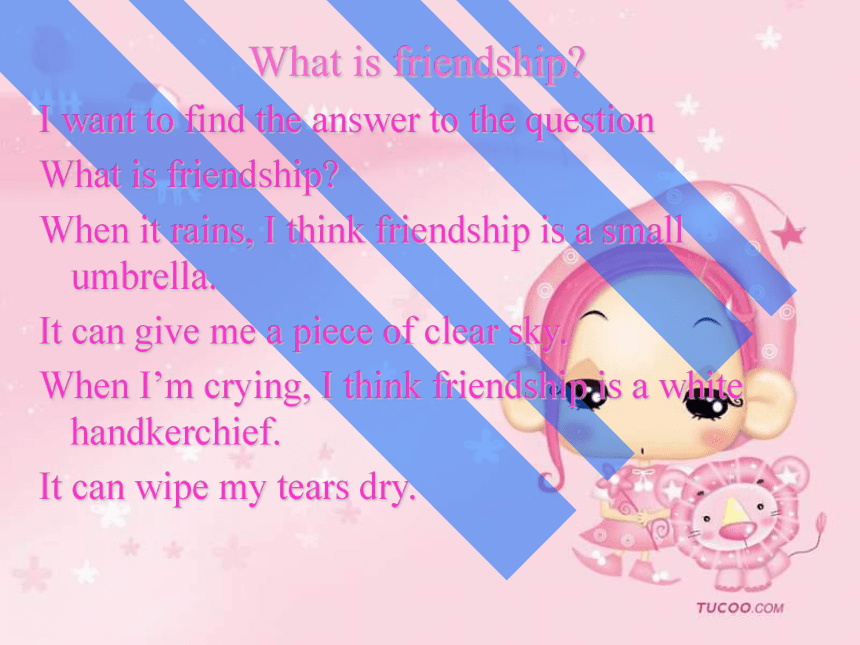
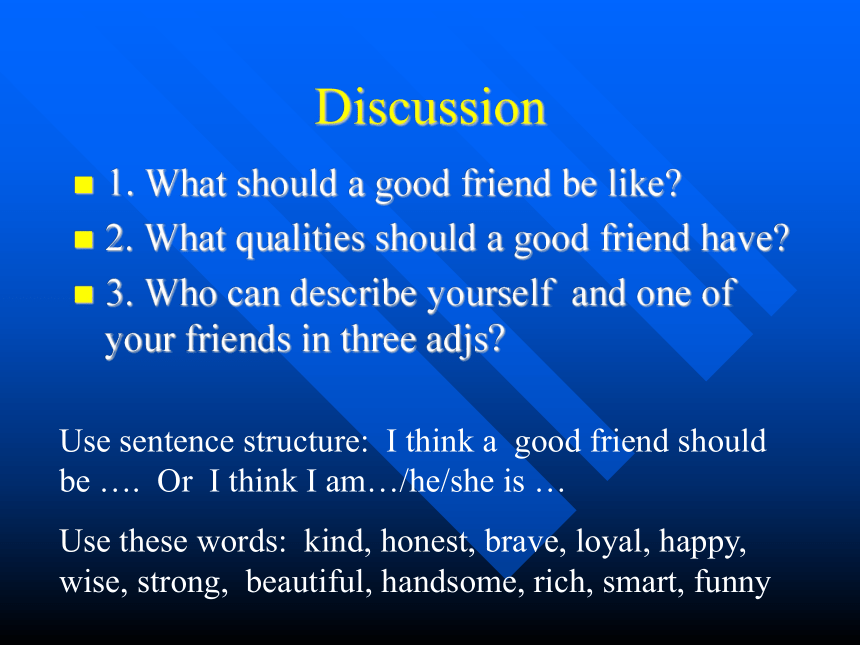
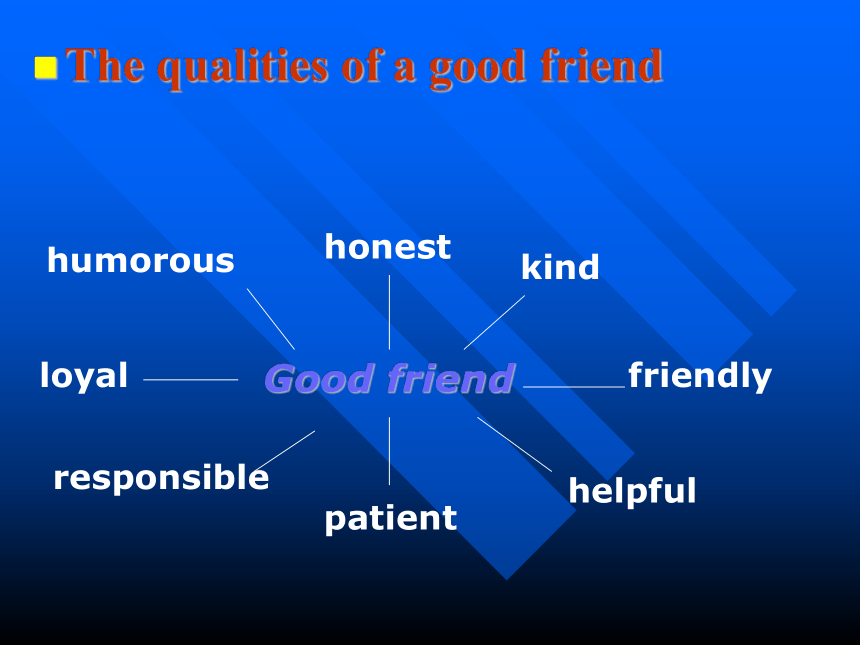
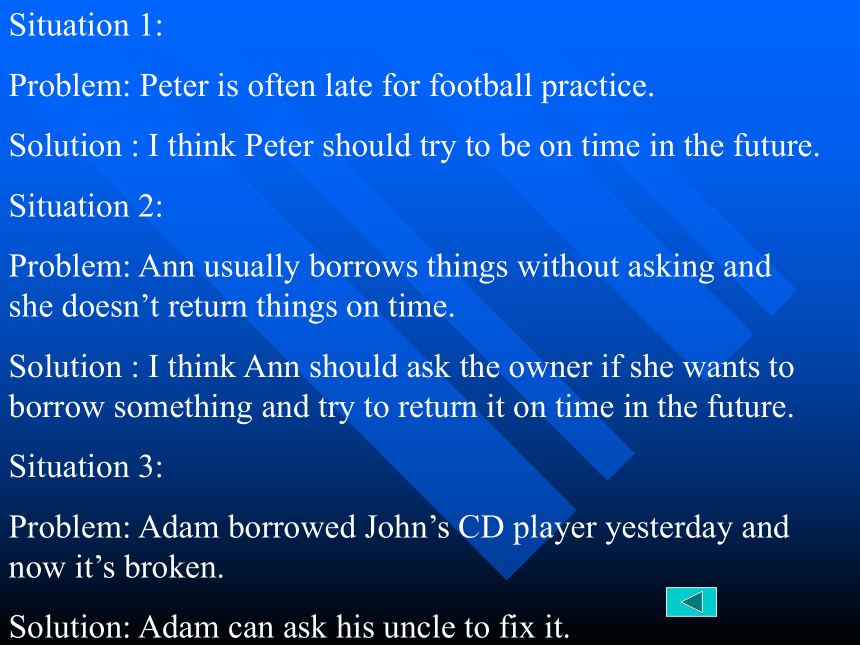
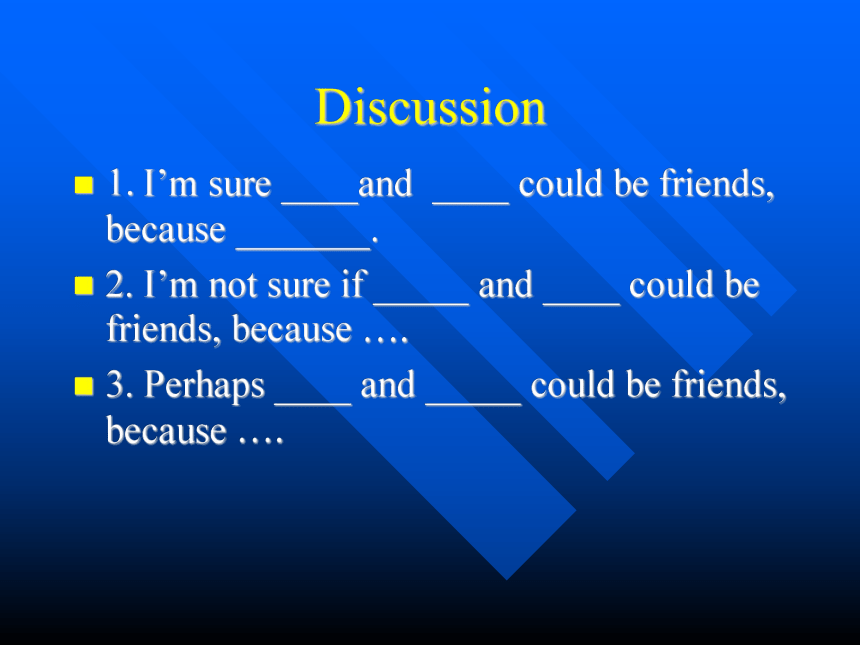
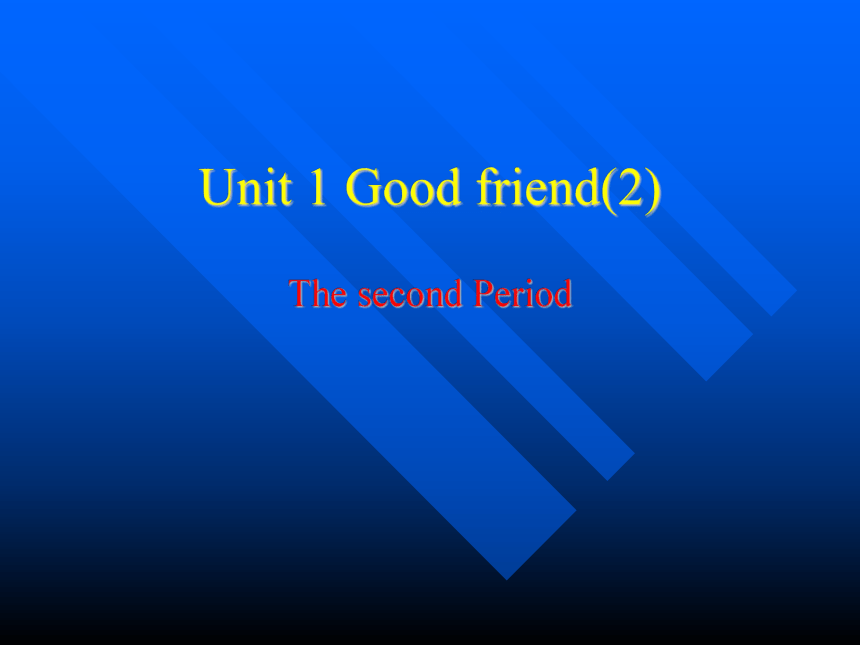
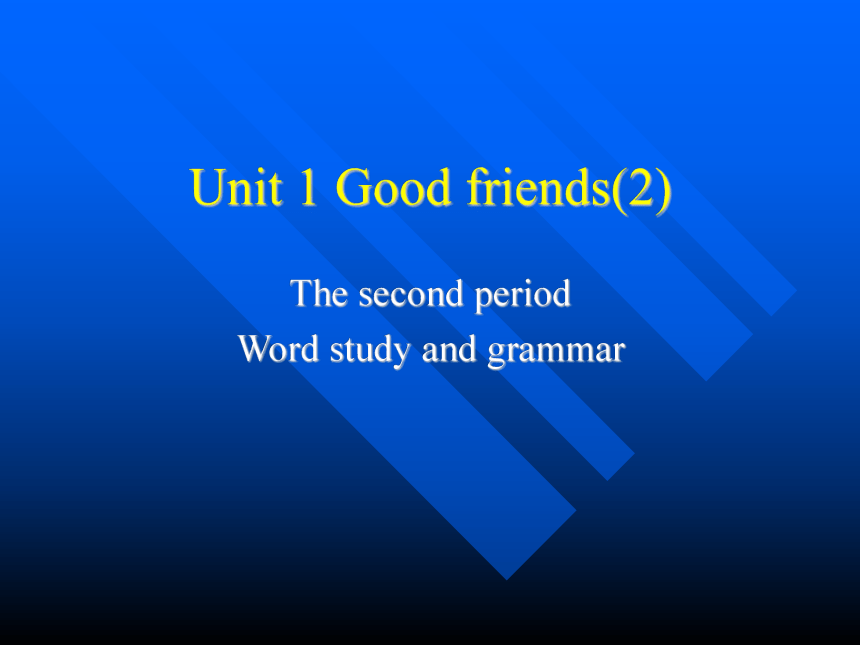
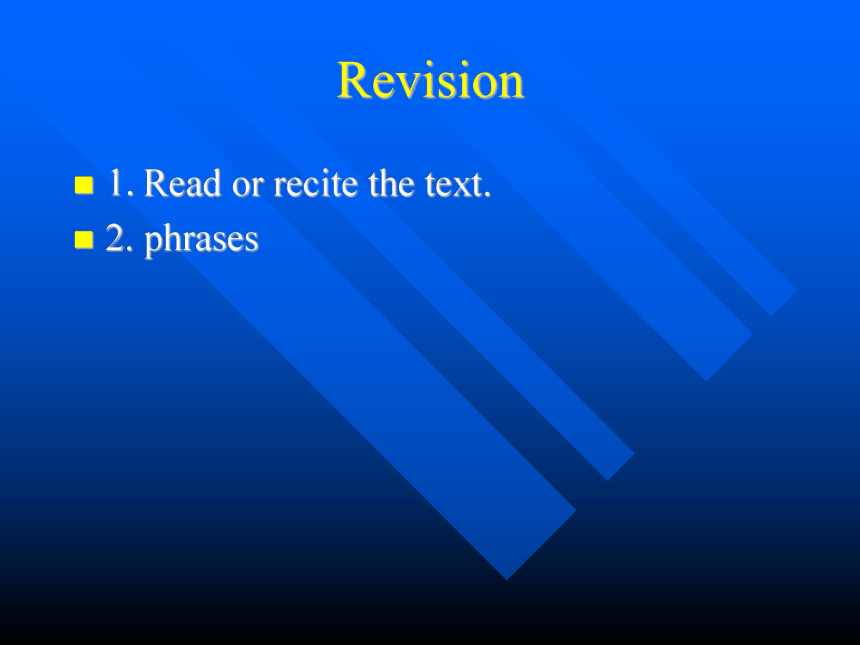
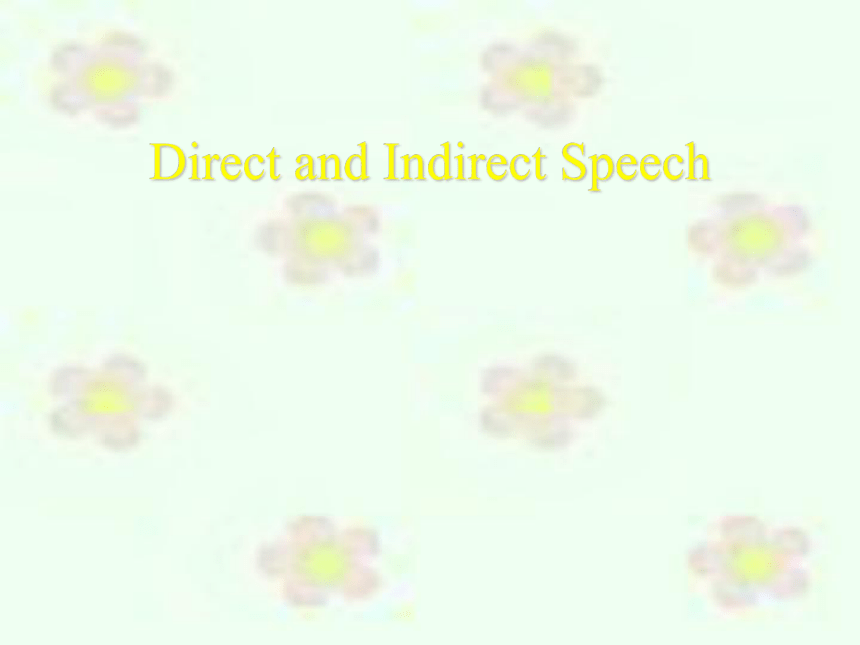
文档简介
课件61张PPT。Unit 1 Good friends(1)The first Period Unit one
Friendship (The first Class)Welcome to our ClassStep I Lead inWhat’s friendship ?
What do your think about friendship?
Which kind of friendship is best?Have you heard of these sayings?
A Friend in need
is a friend indeed.
Make new friends and keep the old;
One is silver and the other is gold.
Free talk:What is friendship?
I want to find the answer to the question
What is friendship?
When it rains, I think friendship is a small umbrella.
It can give me a piece of clear sky.
When I’m crying, I think friendship is a white handkerchief.
It can wipe my tears dry.
Discussion1. What should a good friend be like?
2. What qualities should a good friend have?
3. Who can describe yourself and one of your friends in three adjs?
Use sentence structure: I think a good friend should be …. Or I think I am…/he/she is …
Use these words: kind, honest, brave, loyal, happy, wise, strong, beautiful, handsome, rich, smart, funnyThe qualities of a good friend
Good friend
honestkind
friendly
helpful
humorous
responsible
loyalpatientSituation 1:
Problem: Peter is often late for football practice.
Solution : I think Peter should try to be on time in the future.
Situation 2:
Problem: Ann usually borrows things without asking and she doesn’t return things on time.
Solution : I think Ann should ask the owner if she wants to borrow something and try to return it on time in the future.
Situation 3:
Problem: Adam borrowed John’s CD player yesterday and now it’s broken.
Solution: Adam can ask his uncle to fix it.Discussion1. I’m sure ____and ____ could be friends, because _______.
2. I’m not sure if _____ and ____ could be friends, because ….
3. Perhaps ____ and _____ could be friends, because ….Unit 1 Good friend(2)The second PeriodUnit 1 Good friends(2)The second period
Word study and grammarRevision1. Read or recite the text.
2. phrasesDirect and Indirect Speech1.(1)John said,”I like reading novels.”
(2)John said that he liked reading novels.
直接引语:直接引述别人的话.
间接引语:用自己的话转述别人的话.
它构成宾语从句.
2.陈述句(statements):
(1)He said,”I like it very much.”
He said that he liked it very much
(2)Tom said to me,”I broke your CD player.”
Tom told me that he had broken my CD player.
直接引语如果是陈述句,变为间接引语时,用连词that引导(that在口语中可省略),从句中的人称,时态,指示代词,时间状语,地点状语等要做相应变化.1)人称的变化:
(1)He said,”I like it very much.”
He said that he liked it very much.
(2)Tom said to me,”I broke your CD player.”
Tom told me that he had broken my CD player.
2)时态的变化:
主句的谓语动词是一般过去时,直接引语变为间接引语时,从句的谓语动词在时态上要做相应的变化.如主句的谓语动词是现在时,从句的时态无须变化.
(1)一般现在时 一般过去时:
He said,”I am afraid I cannot finish the work.”He said that he was afraid he couldn’t finish
the work.
(2)现在进行时 过去进行时
He said,” I’m using the knife.”
He said that he was using the knife.
(3)现在完成时 过去完成时
She said, “I’ve not heard from him since May.”
She said that she had not heard from him since May.
(4)一般过去时 过去完成时
He said ,”I came to help you.”
He said that he had come to help me.
(5)过去完成时不变
He said,”I had finished my homework before supper.”、
He said that he had finished his homework before supper.
(6)一般将来时 过去将来时
She said,” I’ll do it after class.”
She said that she would do it after class.
3)指示代词,时间状语,地点状语和动词的变化.
(1) She said, “ I’ll finish the work this morning.”
She said that she would finish the work
that morning.
(2)He said, “These books are mine.”
He said that those books were his.
(3)He said, “It’s nine now.”
He said that it was nine then
(4)He said,’I haven’t seen her today.”
He said that he hadn’t seen her that day
(5)She said,”I went there yesterday.”
She said that she had gone there the day before.
(6)She said, “I ’ll go there tomorrow.”
She said that she would go there the next/following day.(7)She said,’He left 30 minutes ago.”
(8)He said,” My sister was here one week ago.”
(9)She said . “I’ll come here this evening.”
She said that he had left 30 minutes before.He said that his sister had been there one week
before.She said that she would go there that evening.He said,”Light travels much faster than sound.”He said that light travels much faster than sound.
注:直接引语如果是客观真理,变为间接引语时,时态不变。注: 如果在当地转述,here不必改成there,动词come也不必改成go2)疑问句(questions)
(1)一般疑问句:直接引语是一般疑问句,变为间接引语时,用连词whether 或if 引导。主句谓语动词是said 时,要改为asked.没有间接宾语的,可加一个间接宾语(me,him,us等)。
(1)He said, “Are you interested in English?”
He asked (me) if I was interested in English.
将疑问句语序改为陈述句语序(主语在谓语前面时),句末用句号,主语的人称,时态和状语要相应变化。
1.引导一般疑问句,用whether / if ,并将问句语序改为陈述句语气。
1)He asked her, “Are you pleased?”
----He asked her if she was pleased.
2) She asked me, “Have you finished the work?”
----She asked me whether I had finished the work.
3)He said,” Did you see him last night?”
He asked (me) whether I had seen him the night before.2.引述特殊疑问句,用原有的疑问词,并将语序改为陈述句。
1) She asked me, “Where have you been all these years?”
-----She asked me where I had been all those years.
2) He asked her, “How much does the necklace cost?”
-----He asked her how much the necklace cost.
3) “What can I do for you?” he asked me.
-----He asked (me) what he could do for me.Grammar
3.祈使句
将祈使句的动词原形变为带to的不定式,并在不定式的前面根据句子的意思加上tell,ask,order等动词,句型是:tell/ask /order someone (not) to do something.)
e.g. “Make sure the door is shut ,” she said to her little son.
She told her little son to make sure the door was shut.
祈使句的直接引语 和间接引语1.表示命令的祈使句的间接引语
句型:tell/order sb (not) to do sth1) “Open the door.” he said.2) “Put up your hand.” he said.3) “Be quiet.” The teacher said to the students.He told/ordered me to open the door.He ordered/told me to put up my hand.The teacher told/ordered the students to be quite.★如果祈使句为否定式,不定式前加not.
“Don’t smoke in the room,” he said to me.
He told me not to smoke in the room.4) “Don’t sleep in class.” the teacher said to the students.The teacher told the students not to sleep in class.5) “Don’t laugh at others.”his parents said.His parents told him not to laugh at others.6) “Don’t tough anything.” he said to him.He told him not to touch anything.2.表示请求的祈使句的变成间接引语句型:ask/beg sb (not) to do sth1) “Please open your book .” the teacher said.The teacher asked the students to open the book.2) “Please don’t leave me.” she said to him.She begged him not to leave her.3) “Please turn off the lights when you leave the classroom.”the teacher said to him.The teacher asked him to turn off the lights when he left the classroom.3.表示请求的一般疑问句的间接引语句型:ask/beg sb (not) to do sth1)“Would you please open the window”he said.He asked me to open the window.2) “ May I borrow your pen.” he said.He asked me to lend him my pen.表示请求的一般疑问句的间接引语也可用if / whether引导exercise1)今天下午我要去游泳。
我的同学也去。
2)我的字典丢了。
他的字典也丢了。
3)我昨天去了剧院。
他也去了剧院。
4)她正在做作业。
我也正在做作业。
1. 被转述的话语是陈述句时,间接引语常由that引导的一个宾语从句构成。“said/told +that+陈述句”.
She said to me, “I like Japanese very much.”
She said (that) she liked Japanese very much.
当将被转述话语是一般客观真理或事实时,时态不变化。
The teacher said to me, “A friend in need is a friend indeed.”
The teacher told me that a friend in need is a friend indeed.
Exercises(direct---indirect)1.“ I’m very glad to visit your factory,” said the visitor.
The visitor said that he was very glad to visit our factory.
3. “There is something wrong with the front wheel,” said Uncle Wang.
Uncle Wang said (that) there was something wrong with the front wheel.
5. “When shall we go outing this autumn?” the students asked.
The students asked when they should go outing that autumn.
7. “Mum has gone to the supermarket,” the daughter said to her father.
The daughter told her father that Mom had gone to the supermarket.
9. “Why were you so excited today?” Tom asked Bob.
Tom asked Bob why he was so excited that day.
Indirect ---direct2. The woman told us that she did not like American movies very much.
“I don’t like American movies very much.” the woman said to us.
4. The teacher told the students that they were going to have a meeting at three o’clock.
The teacher said to the students, “ We are going to have a meeting at three o’clock.”
Suggested answers6. She said that she would try to finish reading the book by the end of this week.
She said, “ I will try to finish reading the book by the end of this week.”
8. Sarah’s friend asked her if she was going to mail the gifts to her parents.
Sara’s friend said to her, “ Are you going to mail the gift to your parents?”
10. Sandra asked her friend how she could solve the problem.
Sandra said to her friend, “ How can you solve the problem?”Suggested answersYou: Chuck, Wilson asks why you want to leave the island.
Wilson: Aren’t I your friend?
You: Chuck, Wilson asks you if he is your friend.
Wilson: How long have we been here?
You: Chuck, Wilson asks you how long you have been here.
Wilson: How will we leave?
You: Chuck, Wilson asks how you will leave.Wilson: That might be dangerous.
You: Wilson says that might be dangerous.
Wilson: Will you take care of me?
You: Chuck, Wilson asks if you will take care of him.
Wilson: I’m scared, Chuck.
You: Chuck, Wilson says that he is scared.Workbook page 871. Mary told YangMei
that she was doing a biology experiment then.
2. that she was not free that day.
3. that she must finish her paper that week.
4. that she would have to stay in the lab until the next day.
5. that she was going to write a report the next week.
6. that she had watched a very interesting TV programme the day before.7. that she must wait there that afternoon.
8. if she would go to the Students’ Club that afternoon.
9. that she had visited her teacher the day before.
10. who was going to study abroad the next year.Unit 1 Good friends (3)The third periodDirect to indirect1. “I broke your CD player,” he said to me.
2. “Are you sure you didn’t do anything to this?” he asked me.
3. Tom said, “I bought a book for my brother yesterday.”
4. He said, “I shall meet her at my office.”
5. The teacher said, “I must go now.”1. He told me that he had broken my CD player.
2. He asked me if I was sure I hadn’t done anything to that.
3. Tom said that he had bought a book for his brother the day before.
4. He said that he would meet her at his office.
5. The teacher said he had to go/must go then.Indirect to direct6. I said that I would try my best.
7. He asked how long it took to do the work.
8. Bob asked John whether he had seen his wallet.
9. His aunt said that she had got there five days before.
10. I asked Tom why he had not told her the truth.6. I said, “I’ll try my best.”
7. He asked, “How long does it take to do the work?”
8. Bob asked John, “Have you seen my wallet?”
9. His aunt said, “ I got here five days ago.”
10. “Why didn’t you tell her the truth?” I asked Tom.Test of phrases1. They’re always ____________(为…争吵) money.
2. She was laughing _______(一直)just now.
3. Boys __________(喜欢)football.
4. The boy ____________ (上网)as soon as he is free.
5. He brought some coal ________(来生火) arguing about all the time are fond of surfs the Internet to make a fire6. If you were alone on a deserted island, you would have to ________(搜寻)water and food.
7. He was lucky enough to ____________ (飞机失事后仍活着).
8. When he was in the countryside, he _______ (交上了朋友)with the peasants there.
9. The police ______his death ______(把…看作)a case of murder.
10. There were 30 passengers ________(在飞机上)when the plane was crashing. hunt for survive the crash made friends treated as on board11. We started early _________(为了)arrive before dark.
12. She didn’t _______(在乎)anything people might say. in order to care aboutSuggested e-mailDear Jack,
Hello, I’d like very much to have a e-pal in the USA.
My name is Li Lin. I’m fifteen, female. Now I’m 1.70 metres tall and studying at Tongde Middle School of Wenzhou in Zhejiang Province, China. I’m good at English. My School is one of the best schools in Wenzhou. I also love painting. My hobby is collecting stamps. I’m also interested in coin-collecting.
I wonder if you are interested in these. Will you please tell me something else about your life and your school? I’m looking forward to hearing from you soon.
Yours
Li LinSee you,Bye!Period 4 1. Jack told me he enjoyed his stay here and he would come again.
2. The teacher asked what they were arguing.
3. Mary told her father that her mother has gone to the supermarket.
4. When he worked there, he could earn as many as 500 dollars a week.
5. I don’t enjoy to read too much.thatabouthadmuch reading6. He is a successful manager of a company that sends mail all over the world.
7. He has to learn how to collect water, hunting for food, and make fire.
8. If you are interesting in being friends, drop me a line.
9. I think that rock music is too aloud, and that football is boring.
10. He said he liked reading, specially stories about people from other countries.inhuntinterestedloudespecially1. Each ticket admits two people to the party.
2. Some animals can survive in the desert on very little water.
3. The mother cared for the sick child day and night.
4. There’s only one bedroom, so we’ll have to share.5. The old woman treated her as her own daughter/ as if she were her own daughter.
6. There were 50 people on board when the ship sank.
7. I was walking along the street when suddenly a car stopped me.
8. We all study foreign languages such as English, French and Japanese.
9. Although we often argue with each other, we are good friends.
10. He didn’t realize his mistake until we pointed it out to him.1. need 改为needs
2. like 改为 as
3. and 改为 or
4. difficulty 改为difficulties
5. 定冠词the 去掉
6. easy 后加to
7. understand 改为understanding
8. 正确
9. advices 改为advice
10. more 前加the Friends are very important to us. When in trouble we need friends to offer us encouragement and help. When we are successful ,we need friends to share our joys. It’s hard to imagine life without friends.We should make as many friends as we can. The more friends we have , the more meaningful our life will be . A country, too, needs friends. China today, for example, has friends all over the world, and she is certain to make more friends in the future.However, real friends are not easy to find. Please value your friendship. It’s easier to lose than to get.
Friendship (The first Class)Welcome to our ClassStep I Lead inWhat’s friendship ?
What do your think about friendship?
Which kind of friendship is best?Have you heard of these sayings?
A Friend in need
is a friend indeed.
Make new friends and keep the old;
One is silver and the other is gold.
Free talk:What is friendship?
I want to find the answer to the question
What is friendship?
When it rains, I think friendship is a small umbrella.
It can give me a piece of clear sky.
When I’m crying, I think friendship is a white handkerchief.
It can wipe my tears dry.
Discussion1. What should a good friend be like?
2. What qualities should a good friend have?
3. Who can describe yourself and one of your friends in three adjs?
Use sentence structure: I think a good friend should be …. Or I think I am…/he/she is …
Use these words: kind, honest, brave, loyal, happy, wise, strong, beautiful, handsome, rich, smart, funnyThe qualities of a good friend
Good friend
honestkind
friendly
helpful
humorous
responsible
loyalpatientSituation 1:
Problem: Peter is often late for football practice.
Solution : I think Peter should try to be on time in the future.
Situation 2:
Problem: Ann usually borrows things without asking and she doesn’t return things on time.
Solution : I think Ann should ask the owner if she wants to borrow something and try to return it on time in the future.
Situation 3:
Problem: Adam borrowed John’s CD player yesterday and now it’s broken.
Solution: Adam can ask his uncle to fix it.Discussion1. I’m sure ____and ____ could be friends, because _______.
2. I’m not sure if _____ and ____ could be friends, because ….
3. Perhaps ____ and _____ could be friends, because ….Unit 1 Good friend(2)The second PeriodUnit 1 Good friends(2)The second period
Word study and grammarRevision1. Read or recite the text.
2. phrasesDirect and Indirect Speech1.(1)John said,”I like reading novels.”
(2)John said that he liked reading novels.
直接引语:直接引述别人的话.
间接引语:用自己的话转述别人的话.
它构成宾语从句.
2.陈述句(statements):
(1)He said,”I like it very much.”
He said that he liked it very much
(2)Tom said to me,”I broke your CD player.”
Tom told me that he had broken my CD player.
直接引语如果是陈述句,变为间接引语时,用连词that引导(that在口语中可省略),从句中的人称,时态,指示代词,时间状语,地点状语等要做相应变化.1)人称的变化:
(1)He said,”I like it very much.”
He said that he liked it very much.
(2)Tom said to me,”I broke your CD player.”
Tom told me that he had broken my CD player.
2)时态的变化:
主句的谓语动词是一般过去时,直接引语变为间接引语时,从句的谓语动词在时态上要做相应的变化.如主句的谓语动词是现在时,从句的时态无须变化.
(1)一般现在时 一般过去时:
He said,”I am afraid I cannot finish the work.”He said that he was afraid he couldn’t finish
the work.
(2)现在进行时 过去进行时
He said,” I’m using the knife.”
He said that he was using the knife.
(3)现在完成时 过去完成时
She said, “I’ve not heard from him since May.”
She said that she had not heard from him since May.
(4)一般过去时 过去完成时
He said ,”I came to help you.”
He said that he had come to help me.
(5)过去完成时不变
He said,”I had finished my homework before supper.”、
He said that he had finished his homework before supper.
(6)一般将来时 过去将来时
She said,” I’ll do it after class.”
She said that she would do it after class.
3)指示代词,时间状语,地点状语和动词的变化.
(1) She said, “ I’ll finish the work this morning.”
She said that she would finish the work
that morning.
(2)He said, “These books are mine.”
He said that those books were his.
(3)He said, “It’s nine now.”
He said that it was nine then
(4)He said,’I haven’t seen her today.”
He said that he hadn’t seen her that day
(5)She said,”I went there yesterday.”
She said that she had gone there the day before.
(6)She said, “I ’ll go there tomorrow.”
She said that she would go there the next/following day.(7)She said,’He left 30 minutes ago.”
(8)He said,” My sister was here one week ago.”
(9)She said . “I’ll come here this evening.”
She said that he had left 30 minutes before.He said that his sister had been there one week
before.She said that she would go there that evening.He said,”Light travels much faster than sound.”He said that light travels much faster than sound.
注:直接引语如果是客观真理,变为间接引语时,时态不变。注: 如果在当地转述,here不必改成there,动词come也不必改成go2)疑问句(questions)
(1)一般疑问句:直接引语是一般疑问句,变为间接引语时,用连词whether 或if 引导。主句谓语动词是said 时,要改为asked.没有间接宾语的,可加一个间接宾语(me,him,us等)。
(1)He said, “Are you interested in English?”
He asked (me) if I was interested in English.
将疑问句语序改为陈述句语序(主语在谓语前面时),句末用句号,主语的人称,时态和状语要相应变化。
1.引导一般疑问句,用whether / if ,并将问句语序改为陈述句语气。
1)He asked her, “Are you pleased?”
----He asked her if she was pleased.
2) She asked me, “Have you finished the work?”
----She asked me whether I had finished the work.
3)He said,” Did you see him last night?”
He asked (me) whether I had seen him the night before.2.引述特殊疑问句,用原有的疑问词,并将语序改为陈述句。
1) She asked me, “Where have you been all these years?”
-----She asked me where I had been all those years.
2) He asked her, “How much does the necklace cost?”
-----He asked her how much the necklace cost.
3) “What can I do for you?” he asked me.
-----He asked (me) what he could do for me.Grammar
3.祈使句
将祈使句的动词原形变为带to的不定式,并在不定式的前面根据句子的意思加上tell,ask,order等动词,句型是:tell/ask /order someone (not) to do something.)
e.g. “Make sure the door is shut ,” she said to her little son.
She told her little son to make sure the door was shut.
祈使句的直接引语 和间接引语1.表示命令的祈使句的间接引语
句型:tell/order sb (not) to do sth1) “Open the door.” he said.2) “Put up your hand.” he said.3) “Be quiet.” The teacher said to the students.He told/ordered me to open the door.He ordered/told me to put up my hand.The teacher told/ordered the students to be quite.★如果祈使句为否定式,不定式前加not.
“Don’t smoke in the room,” he said to me.
He told me not to smoke in the room.4) “Don’t sleep in class.” the teacher said to the students.The teacher told the students not to sleep in class.5) “Don’t laugh at others.”his parents said.His parents told him not to laugh at others.6) “Don’t tough anything.” he said to him.He told him not to touch anything.2.表示请求的祈使句的变成间接引语句型:ask/beg sb (not) to do sth1) “Please open your book .” the teacher said.The teacher asked the students to open the book.2) “Please don’t leave me.” she said to him.She begged him not to leave her.3) “Please turn off the lights when you leave the classroom.”the teacher said to him.The teacher asked him to turn off the lights when he left the classroom.3.表示请求的一般疑问句的间接引语句型:ask/beg sb (not) to do sth1)“Would you please open the window”he said.He asked me to open the window.2) “ May I borrow your pen.” he said.He asked me to lend him my pen.表示请求的一般疑问句的间接引语也可用if / whether引导exercise1)今天下午我要去游泳。
我的同学也去。
2)我的字典丢了。
他的字典也丢了。
3)我昨天去了剧院。
他也去了剧院。
4)她正在做作业。
我也正在做作业。
1. 被转述的话语是陈述句时,间接引语常由that引导的一个宾语从句构成。“said/told +that+陈述句”.
She said to me, “I like Japanese very much.”
She said (that) she liked Japanese very much.
当将被转述话语是一般客观真理或事实时,时态不变化。
The teacher said to me, “A friend in need is a friend indeed.”
The teacher told me that a friend in need is a friend indeed.
Exercises(direct---indirect)1.“ I’m very glad to visit your factory,” said the visitor.
The visitor said that he was very glad to visit our factory.
3. “There is something wrong with the front wheel,” said Uncle Wang.
Uncle Wang said (that) there was something wrong with the front wheel.
5. “When shall we go outing this autumn?” the students asked.
The students asked when they should go outing that autumn.
7. “Mum has gone to the supermarket,” the daughter said to her father.
The daughter told her father that Mom had gone to the supermarket.
9. “Why were you so excited today?” Tom asked Bob.
Tom asked Bob why he was so excited that day.
Indirect ---direct2. The woman told us that she did not like American movies very much.
“I don’t like American movies very much.” the woman said to us.
4. The teacher told the students that they were going to have a meeting at three o’clock.
The teacher said to the students, “ We are going to have a meeting at three o’clock.”
Suggested answers6. She said that she would try to finish reading the book by the end of this week.
She said, “ I will try to finish reading the book by the end of this week.”
8. Sarah’s friend asked her if she was going to mail the gifts to her parents.
Sara’s friend said to her, “ Are you going to mail the gift to your parents?”
10. Sandra asked her friend how she could solve the problem.
Sandra said to her friend, “ How can you solve the problem?”Suggested answersYou: Chuck, Wilson asks why you want to leave the island.
Wilson: Aren’t I your friend?
You: Chuck, Wilson asks you if he is your friend.
Wilson: How long have we been here?
You: Chuck, Wilson asks you how long you have been here.
Wilson: How will we leave?
You: Chuck, Wilson asks how you will leave.Wilson: That might be dangerous.
You: Wilson says that might be dangerous.
Wilson: Will you take care of me?
You: Chuck, Wilson asks if you will take care of him.
Wilson: I’m scared, Chuck.
You: Chuck, Wilson says that he is scared.Workbook page 871. Mary told YangMei
that she was doing a biology experiment then.
2. that she was not free that day.
3. that she must finish her paper that week.
4. that she would have to stay in the lab until the next day.
5. that she was going to write a report the next week.
6. that she had watched a very interesting TV programme the day before.7. that she must wait there that afternoon.
8. if she would go to the Students’ Club that afternoon.
9. that she had visited her teacher the day before.
10. who was going to study abroad the next year.Unit 1 Good friends (3)The third periodDirect to indirect1. “I broke your CD player,” he said to me.
2. “Are you sure you didn’t do anything to this?” he asked me.
3. Tom said, “I bought a book for my brother yesterday.”
4. He said, “I shall meet her at my office.”
5. The teacher said, “I must go now.”1. He told me that he had broken my CD player.
2. He asked me if I was sure I hadn’t done anything to that.
3. Tom said that he had bought a book for his brother the day before.
4. He said that he would meet her at his office.
5. The teacher said he had to go/must go then.Indirect to direct6. I said that I would try my best.
7. He asked how long it took to do the work.
8. Bob asked John whether he had seen his wallet.
9. His aunt said that she had got there five days before.
10. I asked Tom why he had not told her the truth.6. I said, “I’ll try my best.”
7. He asked, “How long does it take to do the work?”
8. Bob asked John, “Have you seen my wallet?”
9. His aunt said, “ I got here five days ago.”
10. “Why didn’t you tell her the truth?” I asked Tom.Test of phrases1. They’re always ____________(为…争吵) money.
2. She was laughing _______(一直)just now.
3. Boys __________(喜欢)football.
4. The boy ____________ (上网)as soon as he is free.
5. He brought some coal ________(来生火) arguing about all the time are fond of surfs the Internet to make a fire6. If you were alone on a deserted island, you would have to ________(搜寻)water and food.
7. He was lucky enough to ____________ (飞机失事后仍活着).
8. When he was in the countryside, he _______ (交上了朋友)with the peasants there.
9. The police ______his death ______(把…看作)a case of murder.
10. There were 30 passengers ________(在飞机上)when the plane was crashing. hunt for survive the crash made friends treated as on board11. We started early _________(为了)arrive before dark.
12. She didn’t _______(在乎)anything people might say. in order to care aboutSuggested e-mailDear Jack,
Hello, I’d like very much to have a e-pal in the USA.
My name is Li Lin. I’m fifteen, female. Now I’m 1.70 metres tall and studying at Tongde Middle School of Wenzhou in Zhejiang Province, China. I’m good at English. My School is one of the best schools in Wenzhou. I also love painting. My hobby is collecting stamps. I’m also interested in coin-collecting.
I wonder if you are interested in these. Will you please tell me something else about your life and your school? I’m looking forward to hearing from you soon.
Yours
Li LinSee you,Bye!Period 4 1. Jack told me he enjoyed his stay here and he would come again.
2. The teacher asked what they were arguing.
3. Mary told her father that her mother has gone to the supermarket.
4. When he worked there, he could earn as many as 500 dollars a week.
5. I don’t enjoy to read too much.thatabouthadmuch reading6. He is a successful manager of a company that sends mail all over the world.
7. He has to learn how to collect water, hunting for food, and make fire.
8. If you are interesting in being friends, drop me a line.
9. I think that rock music is too aloud, and that football is boring.
10. He said he liked reading, specially stories about people from other countries.inhuntinterestedloudespecially1. Each ticket admits two people to the party.
2. Some animals can survive in the desert on very little water.
3. The mother cared for the sick child day and night.
4. There’s only one bedroom, so we’ll have to share.5. The old woman treated her as her own daughter/ as if she were her own daughter.
6. There were 50 people on board when the ship sank.
7. I was walking along the street when suddenly a car stopped me.
8. We all study foreign languages such as English, French and Japanese.
9. Although we often argue with each other, we are good friends.
10. He didn’t realize his mistake until we pointed it out to him.1. need 改为needs
2. like 改为 as
3. and 改为 or
4. difficulty 改为difficulties
5. 定冠词the 去掉
6. easy 后加to
7. understand 改为understanding
8. 正确
9. advices 改为advice
10. more 前加the Friends are very important to us. When in trouble we need friends to offer us encouragement and help. When we are successful ,we need friends to share our joys. It’s hard to imagine life without friends.We should make as many friends as we can. The more friends we have , the more meaningful our life will be . A country, too, needs friends. China today, for example, has friends all over the world, and she is certain to make more friends in the future.However, real friends are not easy to find. Please value your friendship. It’s easier to lose than to get.
